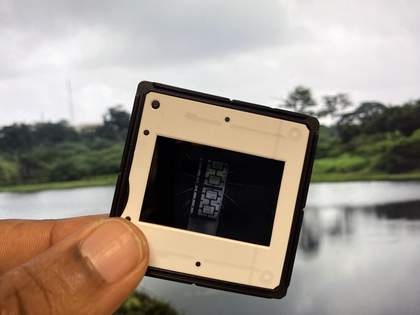
Onyeka Igwe, our generous mother 2025. © Onyeka Igwe
This autumn Tate Britain will premiere a new film installation by Onyeka Igwe, entitled our generous mother. The work continues Igwe’s interest in exploring archives and unravelling histories, in this case focused on the university in Nigeria where the artist’s mother studied in the 1970s. The exhibition is the latest instalment in Art Now, Tate Britain’s long-running programme of free contemporary exhibitions. Celebrating its 30th anniversary this year, Art Now continues to showcase emerging talent and new developments in the British art scene.
Igwe’s new work explores the University of Ibadan, the oldest degree-awarding institution in Nigeria. Moving through the university’s tropical modernist architecture, the film traces the building’s personal and political histories, from its colonial roots through national independence, civil war and towards the present day. It presents many contradictory accounts of the place, blurring fiction with reality, analogue with digital, and fragmentation with unity.
Visitors will enter a dark green space which hosts the film in multiple guises. It first takes the form of a Perspex sculpture that distorts and fractures the content, alluding to the multiple ways one place can be understood. Towards the middle of the space, the work takes the form of a slide projection. This references the format of instructional films made to educate 1950s colonial officers, which combined projected images with scripts to be read aloud. Commandments adapted from one such script – the Ibadan Film Unit Guide – are woven throughout the work. At the back of the gallery, the film then concludes in digital form, projected upon a large cinematic wall. Across all these different iterations of her work, Igwe draws from her own interest in radical filmmaking to deconstruct the history of the University of Ibadan, inviting us to step into the multiple narratives presented across the space.
Since the 1990s, Tate Britain’s Art Now exhibitions have recognised talent at its outset and provided a launch pad for artists who have gone on to become established figures on the international art scene. Over the last 30 years, the series has been an important public platform for the likes of Tacita Dean, Ed Atkins, Fiona Banner, Hurvin Anderson and Doris Salcedo.
Art Now: Onyeka Igwe is supported by the Bukhman Foundation. With additional support from the Art Now Supporters Circle and Tate Americas Foundation. The exhibition is curated by Hannah Marsh, Assistant Curator of Contemporary British Art at Tate Britain.
For press requests, email pressoffice@tate.org.uk. To download press images, visit Tate’s Dropbox.
Listings information
Art Now: Onyeka Igwe
19 September 2025 – 17 May 2026
Tate Britain, Millbank, SW1P 4RG
Open daily 10.00–18.00
Admission free
Visit tate.org.uk and follow @Tate
About Onyeka Igwe
Onyeka Igwe was born in London, where she continues to live and work. Her work has been the subject of recent exhibitions at MoMA PS1 in New York, Bonington Gallery in Nottingham and Peer in London. She has also been included in group exhibitions at venues including Walker Art Gallery in Liverpool, South London Gallery, Museum of Modern Art Warsaw and Haus der Kunst in Munich, as well as at the Lagos Biennial and in the Nigerian Pavillion at the Venice Biennale, and at numerous film festivals around the world.
About the Bukhman Foundation
The Bukhman Foundation was established by Anastasia and Igor Bukhman to support breakthroughs in medical research for Type 1 Diabetes, as well as celebrate the arts and culture, and access to education. The foundation's work within arts and culture is centred on broadening and improving access to creativity and arts education through the support of pioneering institutions, complex and ambitious artistic projects, and ground-breaking young and emerging artists. For more information, visit www.bukhmanfoundation.org
